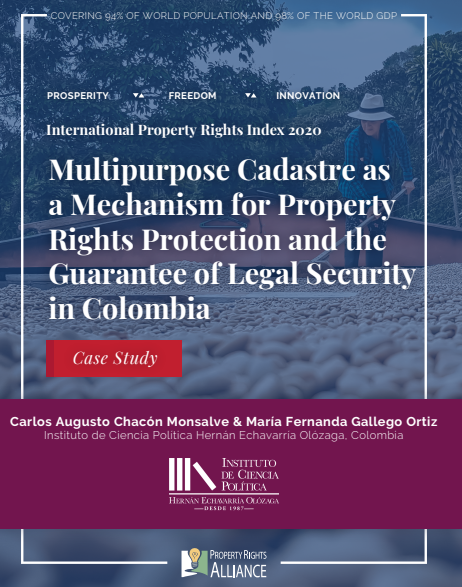International property rights index 2020 PROSPERITY FREEDOM INNOVATION multipurpose cadastre as a mechanism for property rights protection and the guarantee of legal security in Colombia
Autor(es):
Chacón, Carlos A; Gallego, María F
Palabras Clave:
Informaidad, Posesión de Tierras, Inseguridad Jurídica, Regimen Laboral
Resumen:
Colombia has a land informality rate of 54.3%, meaning most people on the plots act as landowners without legally owning it. The informality rate generates high levels of legal insecurity, since without the title, their rights are not enforceable against third parties; and they are exposed to expropriation, dispossession, etc. Informality has been accentuated by the state’s institutional inability to complete a successful cadastre and register. In Colombia, the current system is obsolete due to its lack of flexibility, low coverage, no capacity for updating, and a fiscal perspective that does not answer all the needs of private citizens and the State.According to the Geographic Institute Agustín Codazzi, the authority responsible for the cadaster, 94% of the Colombian territory is not accounted for with the register or has not been updated. The absence of clarity in property deeds, land boundaries, uses or capacity of the fields, prices, etc., threaten property rights and open the door for legal uncertainty. To solve the out-of-date cadaster and aforementioned issues, the administration aims to introduce a multipurpose cadaster that is embodied in the CONPES 3958 and expects to have full coverage by 2025. This research focuses on the importance of this new cadastral approach and its application to protect and promote property rights in Colombia.
Colombia has a land informality rate of 54.3%, meaning most people on the plots act as landowners without legally owning it. The informality rate generates high levels of legal insecurity,
since without the title, their rights are not enforceable against third parties; and they are exposed to expropriation, dispossession, etc. Informality has been accentuated by the state’s institutional inability to complete a successful cadastre and register. In Colombia, the current system is obsolete due to its lack of flexibility, low coverage, no capacity for updating, and a fiscal perspective that does not answer all the needs of private citizens and the State.According to the Geographic Institute Agustín Codazzi, the authority responsible for the cadaster, 94% of the Colombian territory is not accounted for with the register or has not been updated. The absence of clarity in property deeds, land boundaries, uses or capacity of the fields, prices, etc., threaten property rights and open the door for legal uncertainty. To solve the out-of-date cadaster and aforementioned issues, the administration aims to introduce a multipurpose cadaster that is embodied in the CONPES 3958 and expects to have full coverage by 2025. This research focuses on the importance of this new cadastral approach and its application to protect and promote property rights in Colombia.
Proyecto liderado por:
Instituto de Ciencia Política Hernán Echavarría Olózaga, Property Rights Alliance


